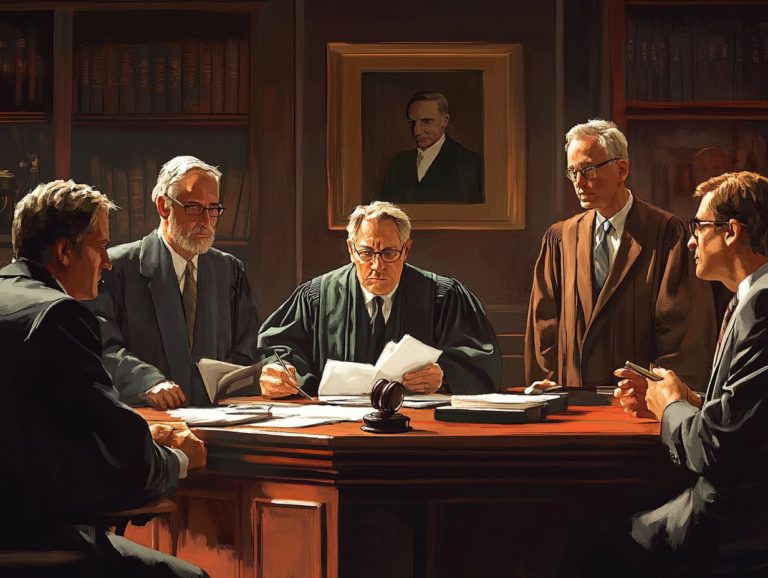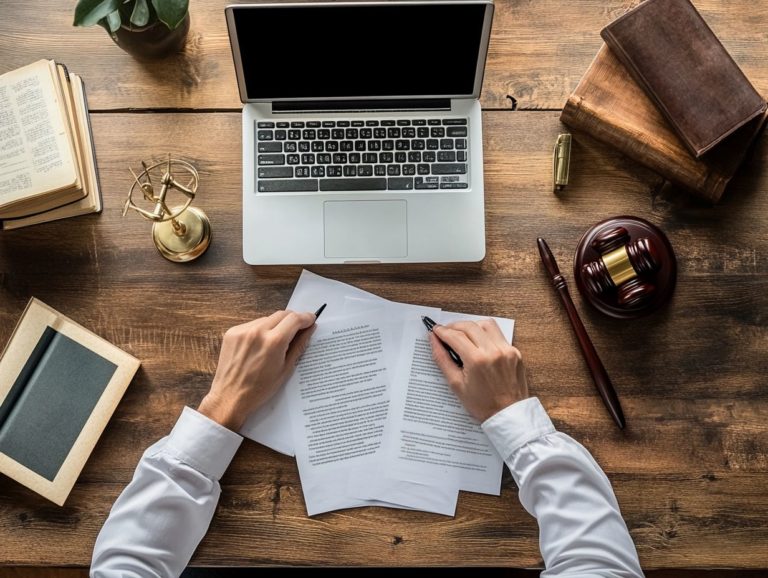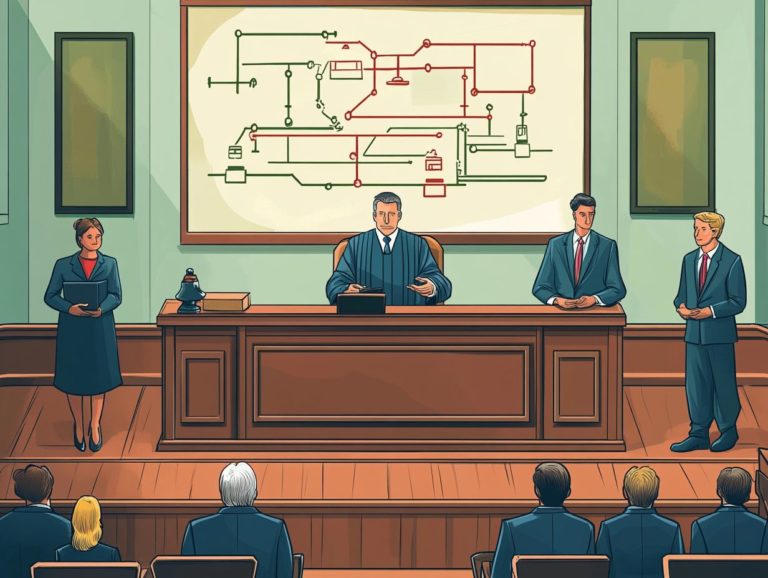The Role of Attorneys in IP Litigation Success
In today s knowledge-driven economy, protecting intellectual property (IP) is crucial for innovation and business success.
This article explores IP litigation and why having skilled attorneys by your side is essential in navigating its complexities.
You ll learn about the legal landscape and discover strategies to overcome common challenges in protecting your intellectual property rights.
Real-world case studies will highlight successful attorney involvement, providing valuable insights for anyone interested in IP litigation.
Contents
- Key Takeaways:
- Overview of IP Litigation
- The Importance of Attorneys in IP Litigation
- Common Challenges in IP Litigation
- How Attorneys Can Help Overcome Challenges
- Case Studies of Successful IP Litigation
- Frequently Asked Questions
- What is the role of attorneys in IP litigation success?
- How can attorneys contribute to IP litigation success?
- What qualities should I look for in an attorney for IP litigation?
- Do I need an attorney for IP litigation if I already have a strong legal team?
- Can I hire any attorney for IP litigation?
- How can I ensure a successful outcome in IP litigation with the help of my attorney?
Key Takeaways:
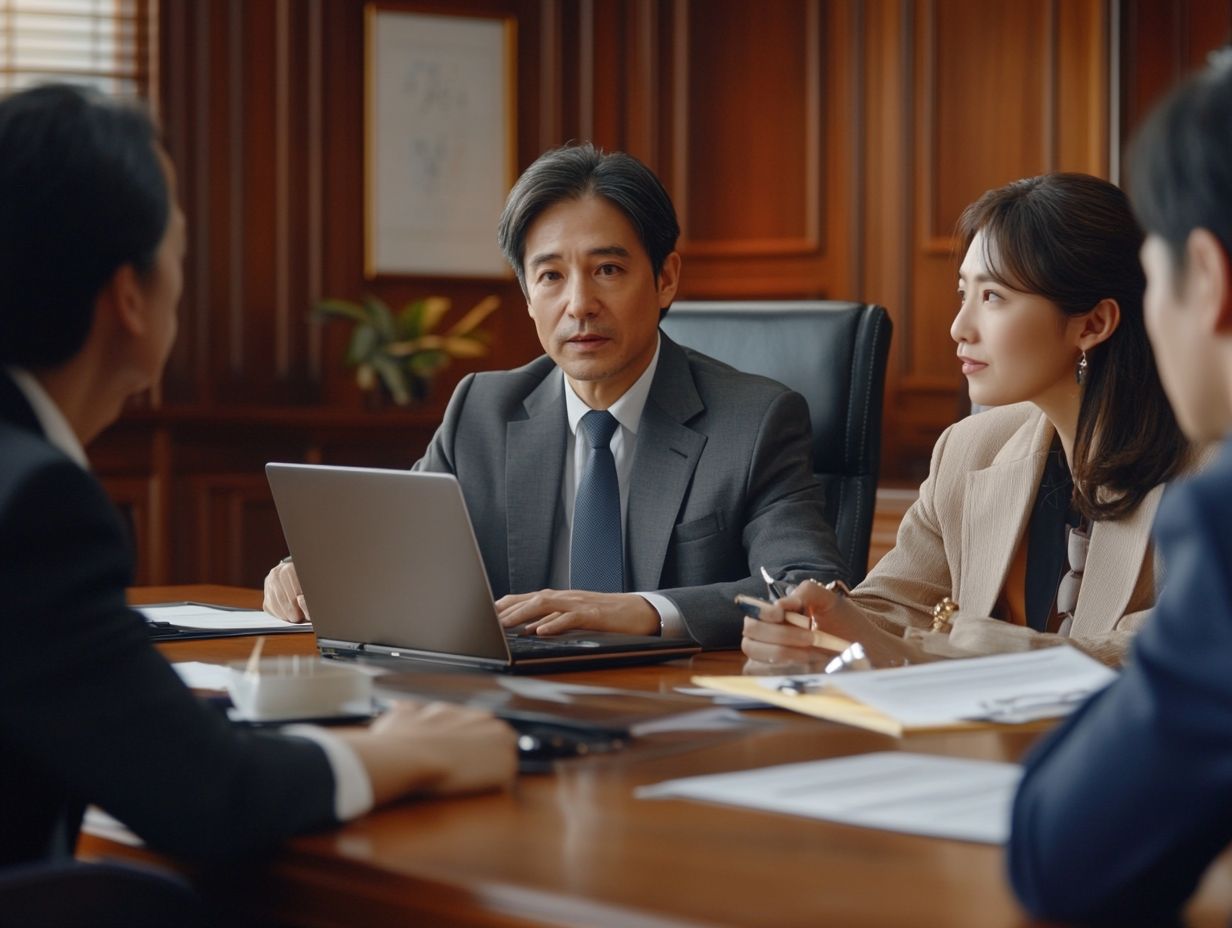
Attorneys play a vital role in IP litigation success. They use their expertise and strategies to help navigate challenges in this complex field.
From understanding laws to protecting IP rights, attorneys provide crucial support in successful cases, particularly regarding the role of the internet in IP litigation, as shown by real-world examples.
Overview of IP Litigation
Intellectual property (IP) litigation is the legal process focused on enforcing and defending IP rights such as patents, trademarks, and copyrights.
This process often involves disputes over ownership and use of unique inventions and creative works.
To navigate these waters, specialized knowledge in patent law and regulatory compliance is essential.
Whether you are a business or an individual, the goal is clear: protect your innovations to maintain a competitive edge.
The stakes are high; outcomes can affect legal ownership, market advantages, and consumer trust.
Your intellectual property deserves top-notch protection, making understanding IP litigation crucial for safeguarding your interests.
What is Intellectual Property Litigation?
Intellectual property litigation includes the processes involved in asserting and defending rights related to IP, like patents, trademarks, and copyrights.
This type of litigation can arise from various situations, such as patent infringement disputes, where one party claims another is using their patented invention without permission.
Trademark disputes often occur when businesses face challenges with brand identity, leading to claims of unfair competition.
Copyright litigation typically arises in creative fields like music, film, and literature where unauthorized reproduction or distribution can lead to conflicts.
Trade secret litigation can also happen when confidential business information is stolen, highlighting the importance of keeping valuable information safe.
Successfully navigating these complex legal waters requires a solid understanding of IP laws and effective strategies for managing disputes.
The Importance of Attorneys in IP Litigation
Your role as an attorney in IP litigation is critical. You provide essential legal advice that can significantly influence the outcomes of disputes, including understanding the role of mediation in IP litigation.
As a skilled patent attorney, you understand the nuances of patent law and the unique needs of your clients.
Your expertise helps clients navigate the filing process, conduct thorough searches, and develop effective negotiation strategies, ensuring business goals are met while minimizing legal risks.
You also enforce patents against third parties and defend against infringement claims, protecting valuable innovations and maintaining competitive advantages.
Expertise and Experience
A skilled patent attorney brings an impressive depth of expertise and experience, which is crucial for navigating the complexities of IP litigation. Their comprehensive grasp of both domestic and international patent law enables them to devise robust strategies that effectively explain and protect your ideas.
Often armed with advanced degrees in science or engineering, these professionals possess the analytical prowess necessary to dissect intricate technical details. Their unique courtroom experiences enhance their litigation skills, allowing them to anticipate opposing arguments and craft compelling rebuttals.
Engaging a patent attorney secures a vital ally who safeguards your inventions and offers invaluable insights into industry trends and competitive positioning.
Legal Strategies and Tactics
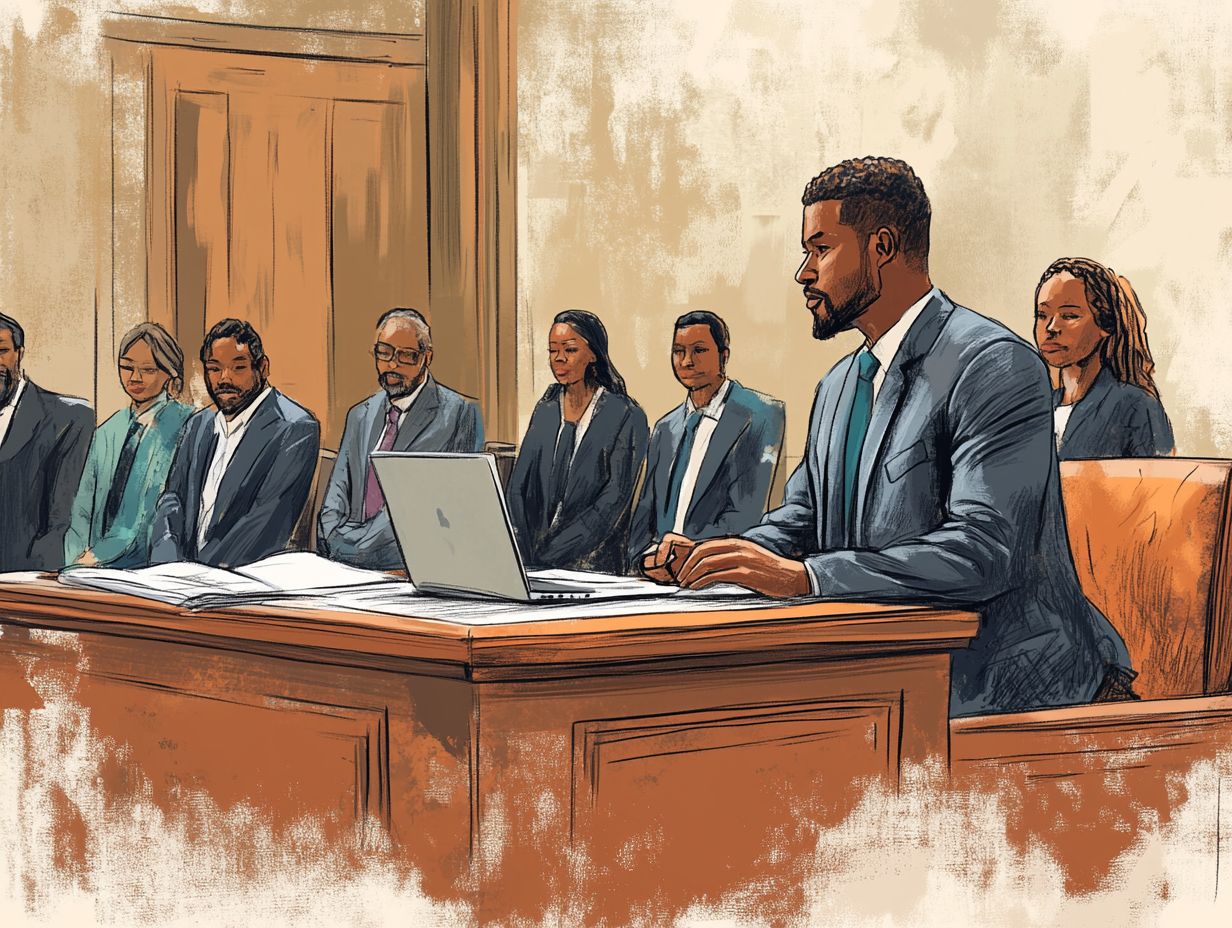
Developing effective legal strategies and tactics is essential in IP litigation. The right approach can pave the way for favorable settlements or wins in court.
To navigate the intricate landscape of intellectual property disputes, legal professionals often employ a blend of negotiation techniques, risk management strategies, and enforcement mechanisms.
Thorough preparation allows you to assess your client s position accurately and craft compelling arguments. Risk management is particularly important, as it involves evaluating potential exposure and outlining contingency plans.
Effective enforcement mechanisms, such as cease-and-desist letters which are letters demanding someone stop infringing on your rights or litigation threats, protect your clients rights and encourage productive negotiations. Each of these strategies highlights the need for strategic planning, enhancing your chances of achieving the desired outcomes in the competitive realm of IP litigation.
Common Challenges in IP Litigation
IP litigation presents a mix of challenges that can complicate your efforts to enforce intellectual property rights.
You ll find yourself dealing with complex legal standards and the details of patent infringement cases. The rapid pace of technological advancement and innovation amplifies these difficulties, making it crucial to stay informed about industry trends and regulatory compliance.
The potential for expensive litigation and protracted examination processes further complicates the landscape for individuals and businesses seeking to assert their IP rights.
Therefore, grasping these challenges is vital for crafting effective strategies to overcome them and safeguard your valuable assets.
Navigating the intricate web of laws and regulations surrounding IP litigation demands a profound understanding of patent law and the legal standards governing intellectual property rights.
This complex landscape presents numerous challenges, as you must consider various statutes, case law precedents, and procedural rules that differ significantly across jurisdictions.
The ever-evolving nature of technology and the digital environment adds yet another layer of complexity, compelling legal professionals to stay updated on new developments in domestic and international law.
These intricacies can profoundly impact the litigation process, influencing your strategic decisions and ultimately determining the outcomes of disputes.
A misinterpretation of these legal nuances could lead to costly delays or unfavorable rulings, underscoring the need for meticulousness in your approach.
Protecting Intellectual Property Rights
Protecting your intellectual property rights is essential in IP litigation. It involves using various enforcement mechanisms to safeguard your patent rights and other forms of intellectual property.
These mechanisms often include registration processes that formally document your inventions or designs, creating a legal framework that solidifies your claims. You might also rely on trade secrets, non-disclosure agreements, and trademarks to protect your brand identity and proprietary information.
Legal protections are crucial and can make or break your case! They deter potential infringement and provide avenues for recourse if a violation occurs.
Enforcement strategies, including litigation and negotiation, are vital for upholding these rights, emphasizing the need for continual vigilance in an ever-competitive marketplace.
Consulting with a patent attorney can help you effectively protect your rights.
How Attorneys Can Help Overcome Challenges
Attorneys are important in guiding clients through the complexities of legal battles over intellectual property rights. They offer not only legal counsel but also effective negotiation strategies that are essential for success, particularly in understanding the role of evidence in IP litigation cases.
Your attorney’s ability to assess risks and provide personalized advice is key to navigating patent law complexities and ensuring compliance with legal standards.
By leveraging their expertise, attorneys create clear risk management plans. These plans address potential issues and strengthen your strategy to protect your intellectual property rights.
Power Up Your Practice with the Right Tools

Using the right resources and tools is crucial for attorneys navigating IP litigation. These resources empower you to offer informed strategic advice to your clients.
By leveraging advanced legal research databases, you can access a wealth of case law, statutes, and precedents vital for constructing strong arguments. Specialized software for patent analysis and trademark searching streamlines your ability to identify potential infringements, ensuring that clients receive timely and effective counsel.
Consulting with industry experts can also enrich your understanding. Accessing legal journals and participating in online forums further enhances your approach to individual cases. Collectively, these resources facilitate thorough preparation and improve your ability to advocate effectively, ultimately aiming to protect your clients’ intellectual property rights with precision and efficiency.
Negotiating Settlements and Resolutions
Negotiating settlements and resolutions is a critical part of IP litigation. Effective negotiation strategies can yield favorable outcomes for you and your clients.
In this complex environment, the importance of strategic planning cannot be overstated; it serves as the foundation for successful discussions. Strong communication skills are essential for navigating intricate matters, such as patent infringements and trademark disputes, while fostering a collaborative atmosphere.
Understanding both parties’ needs is crucial. This insight helps you create persuasive arguments that resonate with your goals.
By anticipating counterarguments and preparing adaptable solutions, you can strengthen your position during negotiations, steering the conversation towards a resolution that minimizes risks and maximizes satisfaction.
Case Studies of Successful IP Litigation
Examining case studies of successful IP litigation reveals the invaluable impact your attorney’s involvement has on achieving favorable legal outcomes. These examples highlight how strategic planning, adept negotiation, and a deep understanding of intellectual property law can lead to successfully enforcing patent rights and resolving intricate disputes, underscoring the role of data in IP litigation decisions.
Each case demonstrates the effectiveness of legal expertise in aligning litigation strategies with broader business objectives, ultimately protecting innovations and intellectual property rights.
Real-World Examples of Attorney Involvement
Real-world examples of attorney involvement in IP litigation underscore the vital role legal counsel plays in securing successful outcomes and protecting your intellectual property rights, including understanding the role of the USPTO in IP litigation.
For instance, a tech startup faced a significant challenge when a larger competitor attempted to patent a similar technology, jeopardizing the startup s future. By engaging skilled attorneys, they devised a robust strategy that included meticulous patent analysis and evidence gathering, leading to a swift dismissal of the competing claims.
In another compelling case, a renowned fashion brand defended its trademark against rampant counterfeiting on online platforms. Their legal team used a mix of cease-and-desist letters and strategic negotiations, resulting in a favorable settlement that protected the brand s reputation and set a new industry precedent.
These cases highlight the essential role that experienced legal experts play in navigating the complex landscape of intellectual property disputes, offering effective strategies for your litigation journey.
Frequently Asked Questions
What is the role of attorneys in IP litigation success?
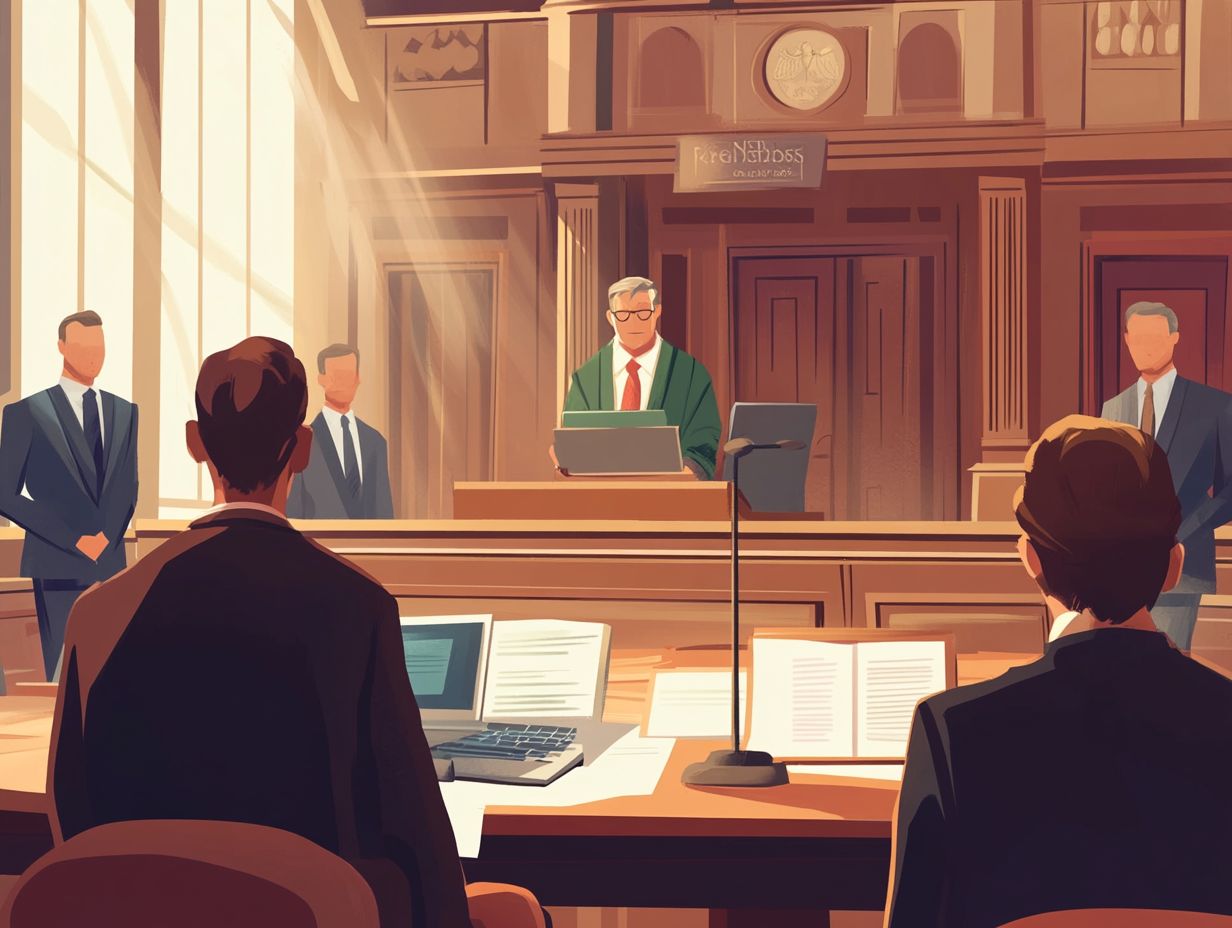
The role of attorneys in IP litigation success is crucial. Attorneys provide legal help and advice to individuals or companies involved in intellectual property (IP) conflicts. Their knowledge and expertise in IP law and litigation strategies can greatly influence the outcome of a case, leading to a successful resolution for their clients.
How can attorneys contribute to IP litigation success?
Attorneys can contribute to IP litigation success in various ways. They conduct thorough research and analysis of the case, while also understanding the role of the court in IP litigation to develop strong legal arguments.
Additionally, they present evidence effectively in court and negotiate settlements while protecting their clients’ rights by enforcing favorable court decisions.
What qualities should I look for in an attorney for IP litigation?
When looking for an attorney to represent you in IP litigation, consider their experience, expertise, and track record in handling similar cases. Look for an attorney who is knowledgeable in IP law, possesses good communication and negotiation skills, and is dedicated to protecting their clients’ rights.
Do I need an attorney for IP litigation if I already have a strong legal team?
You should still hire an attorney focused on IP litigation, even with a strong legal team. IP disputes can be complex and require specialized knowledge and experience. Having an attorney with a focus on IP litigation can provide valuable insights and strategies to help achieve a successful outcome.
Can I hire any attorney for IP litigation?
While any attorney can theoretically handle IP litigation, it’s best to hire a lawyer with experience and expertise in this specific area of law. IP litigation requires a deep understanding of intellectual property laws and court procedures, which a specialized attorney can bring to the table.
How can I ensure a successful outcome in IP litigation with the help of my attorney?
To increase the chances of a successful outcome in IP litigation, maintain open and clear communication with your attorney. Provide all necessary information and evidence, and trust their legal expertise and advice.
Collaborating effectively with your attorney can greatly contribute to the success of your case.

